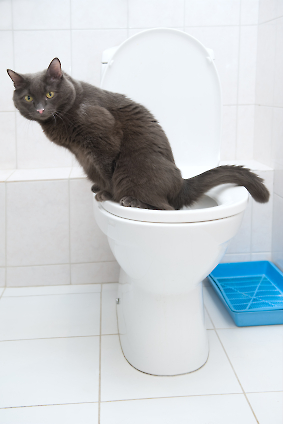by Dawn Todd
 My friend Linda came in for an appointment the other day. She’s a true animal lover, and we’ve helped her with quite a few animal rescues of one sort or another over the years we’ve been in Franklin. She wanted to discuss a vexing problem.
My friend Linda came in for an appointment the other day. She’s a true animal lover, and we’ve helped her with quite a few animal rescues of one sort or another over the years we’ve been in Franklin. She wanted to discuss a vexing problem.
One of her rescues, a shy kitty she took in very young from a feral mother in her neighborhood, has never been 100% reliable about urinating in the litter box. Now, at a year old, her accidents outside the litter box are increasing– and she’s taken to emptying her bladder in Linda’s “Crocs”! Everyone has their limits…. and “Bella” had officially tested Linda’s.
Linda’s foolish feline inspired me to write about this difficult issue. It’s a common frustration that almost all of us living with felines have experienced at one time or another.
Let’s first review the most basic things you can do to prevent litter box problems:
Make it Easy – Litter boxes must be easily accessible to all cats in the house. The rule of thumb is to provide one litter box per cat PLUS one. It’s a prescription for problems to make two cats share a box – two cats should ideally have easy access to three boxes, generally at least one on each floor the cat has access to.
Size Matters – Litter boxes need to be big, minimally one and a half times as long as the cat. I had a client in Raleigh who had 10 cats in her home. She fashioned litter boxes out of large, deep storage boxes. Her husband cut “doors” in the end for cats to come and go from. She left the lid off most of her boxes, but she kept one box covered (some cats prefer privacy). Even though two of her cats were semi-feral, and they were all strictly indoor cats, she never had issues with any of her clowder* eliminating outside of their deluxe boxes.
(*I just found out today that a pride of cats refers only to large wild cats, a group of domestic cats is technically called a clowder – who knew?!)
Keep it Clean – We all know that cats are fastidious about cleanliness, and this goes for their litter boxes as well. Most cats prefer the maid come at least daily.
If your cat has had an accident outside the litter box, it is extremely important to be sure the odor from that accident is eliminated. We sell an excellent product at Noah’s Ark called Urine Off – this product works to “make it like it never happened”– a critical step to preventing that area from being used again as a toilet.
Litter Logic – Individual cats seem to have very particular preferences for the type of litter they prefer. The folks who study these types of things (and yes, there are actually veterinary nerds who do these types of studies), have found that in absolute numbers, more cats prefer clay litter than clumping. That information does nothing for you if you have one of those cats that prefer sand type litter. Cats even show preference between different brands of clay litter, with some preferring unscented, and some gravitating more to Fresh Step – which has a light scent.
My advice is to give your cats a choice. Put out a variety of litters and observe which type they use first, or exclusively. Litters come in far more varieties now than just clay and sand – there’s pine litter, newspaper litter, litter made from corn husks, crystal litter… just to name a few. You may need a little (or a lot) of patience to find out what kind of litter logic your favorite feline has.
Are you living with a Feline Felon?
What about a feline that is already engaging in these unpleasant transgressions outside the box?
The very first thing we MUST do is to determine whether there’s a medical issue underlying this behavior. Urinary tract problems and other medical conditions can create great discomfort, and cause cats to “signal” to you that all is not well.
What if it’s all in their head?
If a thorough physical examination doesn’t reveal a medical problem causing pain or discomfort, there are other things we can try.
First we need to hear about your unique situation. If we can identify stress (from a feline perspective) in the home, we can recommend ways to reduce stress.
Many clients have success with Feliway – products that imitate feline pheromones and calm anxious cats. In tough situations, those not responding to all the basic things that normally help, we can prescribe medications that often improve the undesirable behavior.
There’s an excellent resource page created by the Feline Advisory Bureau. Here you’ll find extensive information about the many possible reasons felines spray and develop house-soiling issues. Click here for more in-depth info. And remember, we’re here to help with all your companion animal questions and challenges.
